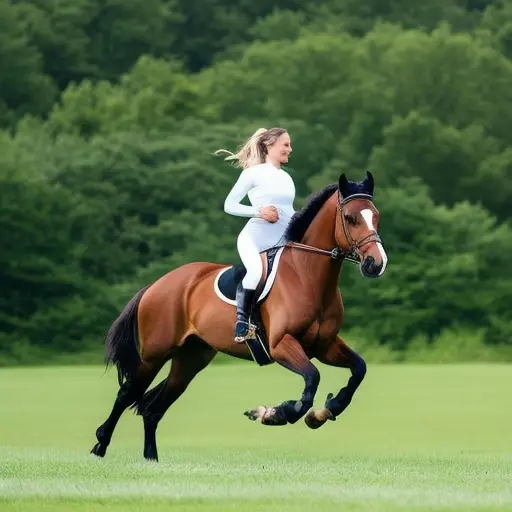The Role of Horses in Therapy and Rehabilitation

Step into the world of therapy and rehabilitation, where a gentle soul awaits to guide you on a journey of healing and strength. The horse, a symbol of grace and power, has become a trusted partner in the field of therapy.
Through equine-assisted activities, these majestic creatures assist in physical, mental, and emotional healing. Discover how horseback riding and interactions with horses can enhance motor skills, promote emotional well-being, and aid in cognitive rehabilitation.
Open your heart to the transformative power of equine therapy.
Equine-Assisted Physical Therapy
You can improve your physical well-being through equine-assisted physical therapy. Equine-assisted rehabilitation, also known as therapeutic horseback riding, is a form of therapy that utilizes horses to help individuals with physical disabilities or injuries. This type of therapy can provide numerous benefits, both physically and emotionally.
When you engage in equine-assisted physical therapy, you’re able to work on improving your strength, balance, and coordination. The movements of the horse can help stimulate your muscles and joints, promoting increased flexibility and range of motion. In addition, the act of riding a horse requires you to engage your core muscles, helping to strengthen your abdominal and back muscles.
Therapeutic horseback riding also offers a unique sensory experience. The rhythmic movements of the horse can have a calming effect on your nervous system, reducing stress and anxiety. The interaction with the horse can also increase your sense of self-confidence and self-esteem.
Furthermore, the bond that forms between you and the horse can be incredibly therapeutic. Horses are perceptive animals that can sense your emotions and respond accordingly. This can create a sense of trust and connection, allowing you to feel supported and understood during your therapy sessions.
Horses in Mental Health Treatment
By engaging with horses, individuals can experience significant benefits in their mental health treatment. Horses have been found to be incredibly effective in aiding individuals who’ve experienced trauma or are struggling with addiction. Here are some ways in which horses can positively impact mental health treatment:
- Horse therapy for trauma: Interacting with horses can help individuals process and heal from traumatic experiences. Horses are sensitive creatures that can sense emotions and respond accordingly. Through activities such as grooming, leading, and riding horses, individuals can learn to establish trust, build confidence, and develop healthy coping mechanisms. This can be particularly beneficial for those who’ve experienced abuse, neglect, or other forms of trauma.
- Equine therapy for addiction: Horses can play a crucial role in addiction recovery. They provide a non-judgmental and accepting environment where individuals can learn important life skills such as responsibility, communication, and self-awareness. By caring for and working with horses, individuals in addiction treatment can develop a sense of purpose, build healthy relationships, and gain a renewed sense of self-worth.
- Emotional regulation and stress reduction: Interacting with horses has been shown to reduce stress and promote emotional regulation. Horses have a calming presence and can help individuals learn to manage their emotions more effectively. The rhythmic motion of horseback riding can also have a soothing effect on the nervous system, reducing anxiety and promoting relaxation.
Enhancing Motor Skills Through Horseback Riding
Enhancing your motor skills can be achieved through horseback riding as it requires coordination and balance. Equestrian therapy benefits individuals by providing physical, emotional, and cognitive improvements. Therapeutic horseback riding techniques are specifically designed to enhance motor skills and promote overall well-being.
Horseback riding engages various muscle groups, promoting strength, endurance, and flexibility. The rhythmic motion of the horse stimulates your vestibular system, improving balance and coordination. As you ride, you must maintain proper posture and alignment, which enhances core stability and body awareness. These skills transfer to everyday activities, improving your ability to walk, run, and perform other physical tasks.
The therapeutic benefits of horseback riding extend beyond physical improvements. Interacting with horses can boost confidence and self-esteem, while also reducing stress and anxiety. The bond that forms between rider and horse promotes emotional connection and trust, creating a safe and supportive environment for personal growth.
Through equestrian therapy, individuals of all ages and abilities can develop valuable motor skills. Whether you’re recovering from an injury, managing a disability, or seeking personal growth and development, horseback riding offers a unique and effective approach. Embrace the opportunity to enhance your motor skills and improve your overall well-being through the transformative power of horseback riding.
Emotional Healing Through Equine Therapy
Experience profound emotional healing through the power of equine therapy. Horses have a unique ability to connect with individuals on a deep emotional level, making them invaluable partners in the healing process. Equine therapy provides a safe and supportive environment where individuals can explore their emotions, build self-awareness, and develop coping skills. The therapeutic benefits of working with horses are truly remarkable.
In equine therapy, individuals can:
- Develop trust: Horses are incredibly perceptive animals and can sense our emotions. By working with them, you can learn to develop trust and create a strong bond, which can be instrumental in the healing process.
- Express emotions: Horses provide a non-judgmental space where you can freely express your emotions. They can help you release pent-up feelings and promote a sense of emotional release and relief.
- Learn empathy: Interacting with horses can teach you empathy and compassion. By observing their behaviors and responding to their needs, you can develop a deeper understanding of others and strengthen your own emotional intelligence.
Equine therapy offers a unique and powerful way to heal emotionally. Through the therapeutic benefits of working with horses, individuals can embark on a transformative journey of self-discovery, healing, and personal growth.
Horses as Partners in Cognitive Rehabilitation
As you explore the role of horses in cognitive rehabilitation, you’ll discover the effectiveness of Equine-Assisted Cognitive Therapy.
This unique approach combines the therapeutic benefits of horse interaction with targeted cognitive exercises.
Through this partnership, individuals can improve their cognitive functioning, enhance problem-solving skills, and boost memory and attention.
Equine-Assisted Cognitive Therapy
Using horses as partners in cognitive rehabilitation can be an effective and engaging way to improve cognitive function. Equine-assisted cognitive therapy combines the therapeutic benefits of equine-assisted learning and equine-assisted psychotherapy to specifically target cognitive impairments.
Here are three ways in which horses can assist in cognitive rehabilitation:
- Interactive activities: Engaging with horses in various activities, such as grooming or leading them, promotes cognitive stimulation and problem-solving skills.
- Sensory experiences: Interacting with horses provides sensory input that can enhance cognitive processing and sensory integration.
- Emotional connection: Building a bond with horses fosters emotional well-being, which in turn positively impacts cognitive function.
Equine-assisted cognitive therapy recognizes the unique ability of horses to facilitate cognitive improvements through their intuitive nature, non-judgmental presence, and the opportunities they provide for meaningful experiences.
Benefits of Horse Interaction
You can discover the numerous benefits of horse interaction as horses serve as partners in cognitive rehabilitation. Interacting with horses can provide therapeutic benefits and contribute to your psychological well-being. The unique bond formed between humans and horses can have a profound impact on cognitive rehabilitation, helping individuals improve their cognitive skills and overall quality of life.
Here are some of the therapeutic benefits of horse interaction in cognitive rehabilitation:
| Benefit | Description |
|---|---|
| Emotional Well-being | Horses have a calming effect, promoting emotional regulation and reducing stress, anxiety, and depression. |
| Cognitive Stimulation | Engaging with horses can enhance cognitive abilities such as attention, memory, problem-solving, and decision-making skills. |
| Social Interaction | Working with horses in a supportive environment encourages social interaction, boosts self-confidence, and improves communication. |
Equine-Assisted Activities for Individuals With Disabilities
When it comes to equine-assisted activities for individuals with disabilities, there are several key points to consider.
Firstly, the benefits of equine therapy are vast and can include improved physical abilities, increased self-esteem, and enhanced cognitive skills.
Secondly, the emotional connection that individuals form with horses during these activities can be incredibly powerful, providing a sense of companionship and unconditional acceptance.
Lastly, through equine-assisted activities, individuals with disabilities have the opportunity to engage in physical exercise and learn new skills in a supportive and inclusive environment.
Benefits of Equine Therapy
Equine therapy offers numerous benefits for individuals with disabilities. Whether it’s for veterans struggling with post-traumatic stress disorder or children with autism, the healing power of horses can make a significant impact on their lives.
- Improved emotional well-being: Interacting with horses can help individuals with disabilities develop a sense of trust, confidence, and self-esteem. The unconditional acceptance and non-judgmental nature of horses provide a safe and supportive environment for emotional growth.
- Enhanced physical abilities: Engaging in equine-assisted activities can improve balance, coordination, and muscle strength. The rhythmic motion of the horse’s movement stimulates sensory integration and helps individuals with disabilities develop better motor skills.
- Increased social skills: Working with horses encourages communication, empathy, and social interaction. Through equine therapy, individuals with disabilities can learn to build relationships, express their emotions, and develop effective communication skills.
Equine therapy is a remarkable tool that allows individuals with disabilities to overcome challenges, gain new abilities, and experience a sense of empowerment.
Emotional Connection With Horses
Experience the profound emotional bond that can be formed between individuals with disabilities and horses through equine-assisted activities.
Horse bonding can have a powerful therapeutic connection for those with disabilities, offering them a unique opportunity for emotional growth and healing.
Horses are incredibly intuitive and sensitive animals, able to sense and respond to human emotions. This allows individuals with disabilities to form a deep and meaningful connection with their equine partners.
The presence of a horse can provide a sense of comfort, acceptance, and unconditional love that may be difficult to find in other relationships.
Through equine-assisted activities, individuals with disabilities can develop trust, improve communication skills, and gain a sense of empowerment.
The emotional connection with horses can be transformative, helping individuals with disabilities to navigate their challenges and enhance their overall well-being.
Improving Physical Abilities
You can enhance your physical abilities through equine-assisted activities for individuals with disabilities. Horses have a unique ability to help improve balance and increase strength, making them ideal companions for rehabilitation and therapy.
Here are a few ways these activities can benefit you:
- Horseback riding: Engaging in horseback riding can improve your balance and coordination as you learn to move with the horse’s rhythm. The dynamic movement of the horse stimulates your core muscles, helping to strengthen your body.
- Grooming and caring for horses: Simple tasks like grooming and caring for horses can help increase your strength and range of motion. From lifting brushes to cleaning hooves, these activities provide a gentle workout for your muscles.
- Therapeutic exercises: Equine-assisted therapy programs often incorporate exercises that target specific physical goals. These exercises are designed to improve your balance and increase your strength in a safe and supportive environment.
Frequently Asked Questions
Are There Any Risks or Safety Concerns Associated With Equine-Assisted Physical Therapy?
There are risks and safety concerns associated with equine-assisted physical therapy. It’s important to consider factors like horse behavior, proper equipment, and trained professionals to ensure a safe and effective experience.
How Do Horses Contribute to Emotional Healing in Equine Therapy?
Horses can contribute to your emotional healing in equine therapy by providing a safe and non-judgmental space for you to express and process your emotions. Their presence and gentle nature can promote psychological healing and overall emotional well-being.
Can Horseback Riding Really Enhance Motor Skills in Individuals?
Horseback riding, my friend, can truly enhance your motor skills. The rhythmic movement and balance required while riding engages your muscles, improves coordination, and strengthens your core. It’s an incredible experience!
What Types of Disabilities Can Benefit From Equine-Assisted Activities?
Various types of disabilities, such as physical, cognitive, and emotional, can benefit from equine-assisted activities. These activities can provide therapeutic benefits, improving motor skills, communication, confidence, and overall well-being.
Is There Any Scientific Evidence to Support the Effectiveness of Horses as Partners in Cognitive Rehabilitation?
Yes, there is scientific evidence supporting the effectiveness of horses in cognitive rehabilitation. Scientific studies have shown that working with horses can lead to cognitive improvement in individuals with various disabilities.
Conclusion
In conclusion, horses serve as incredible partners in therapy and rehabilitation, offering a unique and powerful connection for individuals seeking physical, mental, and emotional healing.
Like gentle guides, they navigate alongside us, helping us find strength, balance, and resilience. Their presence allows us to tap into our inner strength and discover the limitless possibilities within ourselves.
Embracing the healing power of horses is like embracing a ray of sunlight, igniting hope and growth on our journey towards wellness.

Join Davina Gardea on a journey into the world of horsemanship. With a deep passion for horses and years of experience, Davina shares invaluable insights and techniques to enhance your connection with these magnificent creatures. Explore the art of riding, training, and nurturing a profound bond with horses at diedgone.com.





